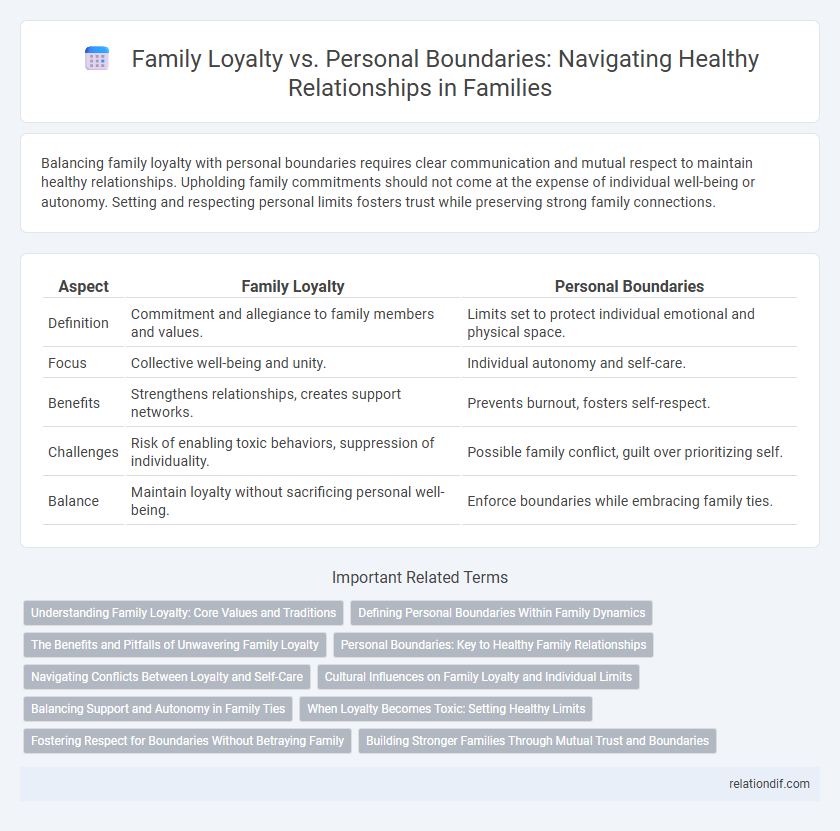Balancing family loyalty with personal boundaries requires clear communication and mutual respect to maintain healthy relationships. Upholding family commitments should not come at the expense of individual well-being or autonomy. Setting and respecting personal limits fosters trust while preserving strong family connections.
Table of Comparison
| Aspect | Family Loyalty | Personal Boundaries |
|---|---|---|
| Definition | Commitment and allegiance to family members and values. | Limits set to protect individual emotional and physical space. |
| Focus | Collective well-being and unity. | Individual autonomy and self-care. |
| Benefits | Strengthens relationships, creates support networks. | Prevents burnout, fosters self-respect. |
| Challenges | Risk of enabling toxic behaviors, suppression of individuality. | Possible family conflict, guilt over prioritizing self. |
| Balance | Maintain loyalty without sacrificing personal well-being. | Enforce boundaries while embracing family ties. |
Understanding Family Loyalty: Core Values and Traditions
Family loyalty centers on unwavering support and commitment rooted in shared core values and long-standing traditions that bind members together. These values often include trust, respect, and mutual care, which uphold the family's identity and collective well-being. Balancing these principles with personal boundaries is essential to maintain individual autonomy while honoring family unity.
Defining Personal Boundaries Within Family Dynamics
Defining personal boundaries within family dynamics is crucial for maintaining healthy relationships and individual well-being. Clear boundaries help prevent emotional exhaustion, promote mutual respect, and allow family members to support one another without overstepping personal limits. Establishing these boundaries ensures a balance between family loyalty and self-care, fostering a respectful and nurturing environment.
The Benefits and Pitfalls of Unwavering Family Loyalty
Unwavering family loyalty fosters deep trust and lifelong support, reinforcing a strong sense of belonging and emotional security within family units. However, excessive loyalty can blur personal boundaries, leading to suppressed individual needs and potential enabling of harmful behaviors. Balancing allegiance with respect for personal autonomy is crucial to maintaining healthy relationships and personal growth.
Personal Boundaries: Key to Healthy Family Relationships
Personal boundaries serve as essential guidelines that protect individual well-being while fostering respect within family dynamics. Establishing clear limits prevents emotional exhaustion and promotes open communication, ensuring each member's needs are acknowledged. Balancing family loyalty with personal boundaries creates a healthier environment where mutual trust and autonomy coexist.
Navigating Conflicts Between Loyalty and Self-Care
Balancing family loyalty and personal boundaries requires clear communication and mutual respect to prevent emotional burnout and maintain healthy relationships. Setting limits on time and emotional investment protects individual well-being while honoring family connections. Recognizing when to prioritize self-care enables effective conflict resolution and sustains long-term family unity.
Cultural Influences on Family Loyalty and Individual Limits
Cultural influences often shape the balance between family loyalty and personal boundaries, with collectivist societies emphasizing strong familial obligations that can challenge individual limits. In such cultures, maintaining family honor and cohesion frequently takes precedence over personal preferences, resulting in heightened expectations for loyalty. Conversely, cultures valuing individualism encourage setting personal boundaries to protect mental health and autonomy, reflecting divergent approaches to managing family dynamics.
Balancing Support and Autonomy in Family Ties
Family loyalty often requires nurturing trust and providing unconditional support, which strengthens intergenerational bonds and emotional resilience. Maintaining personal boundaries ensures each member's autonomy is respected, preventing codependency and fostering individual growth. Balancing support and autonomy creates a healthy dynamic where family ties are both dependable and empowering.
When Loyalty Becomes Toxic: Setting Healthy Limits
Family loyalty often demands unwavering support, but when it disregards personal boundaries, it can foster toxic dynamics that harm individual well-being. Setting healthy limits involves recognizing when loyalty crosses into enabling harmful behavior or emotional manipulation, ensuring respect and self-care remain priorities. Prioritizing clear communication and mutual respect helps maintain balanced relationships where love does not come at the cost of personal integrity.
Fostering Respect for Boundaries Without Betraying Family
Maintaining family loyalty while respecting personal boundaries strengthens trust and preserves individual autonomy. Establishing clear communication and mutual understanding prevents conflicts and nurtures healthy relationships. Prioritizing both respect and loyalty fosters an environment where family members feel valued without compromising their personal space.
Building Stronger Families Through Mutual Trust and Boundaries
Balancing family loyalty with personal boundaries fosters stronger relationships by nurturing mutual respect and trust among members. Establishing clear limits encourages open communication, reduces conflicts, and supports individual well-being within the family unit. Prioritizing both loyalty and boundaries cultivates a healthy environment where everyone feels valued and secure.
family loyalty vs personal boundaries Infographic

 relationdif.com
relationdif.com